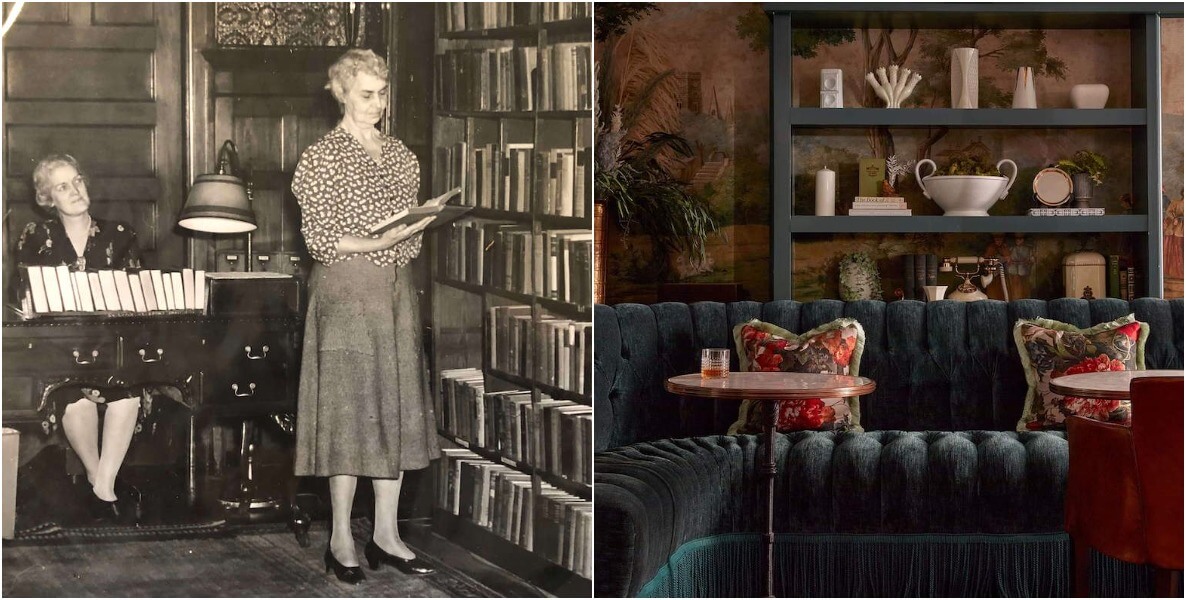Yours dangerously.
That’s how Eliza Sproat Turner, the remarkable Philadelphia suffragette, abolitionist, women’s rights activist, writer, Quaker, and founder of the New Century Guild signed her facetiously menacing letter, written in November 1895, to a senior Guild member. It seems that a troublesome member of her women’s club was scaring off new members by being too antagonistic. After threatening the recipient in a comedic style that wouldn’t fly today—“I have got a gun loaded to shoot you the first time I catch you alone, for scaring poor Miss Tilge…”—Turner emphasized her determination to accomplish some unspecified club activity “Besides, it is no use. I don’t let go of an idea when I have once got a grip on it…”
More than 100 years later, we can still feel the vitality of the indomitable Eliza Turner coming off the page. It’s no surprise that she founded a women’s club in 1882 that grew into one of the largest organizations in the country to advance the interests of women in the workforce with a broad spectrum of educational classes and social activities. Guild members worked for equal wages, improved working conditions, and to be represented politically.
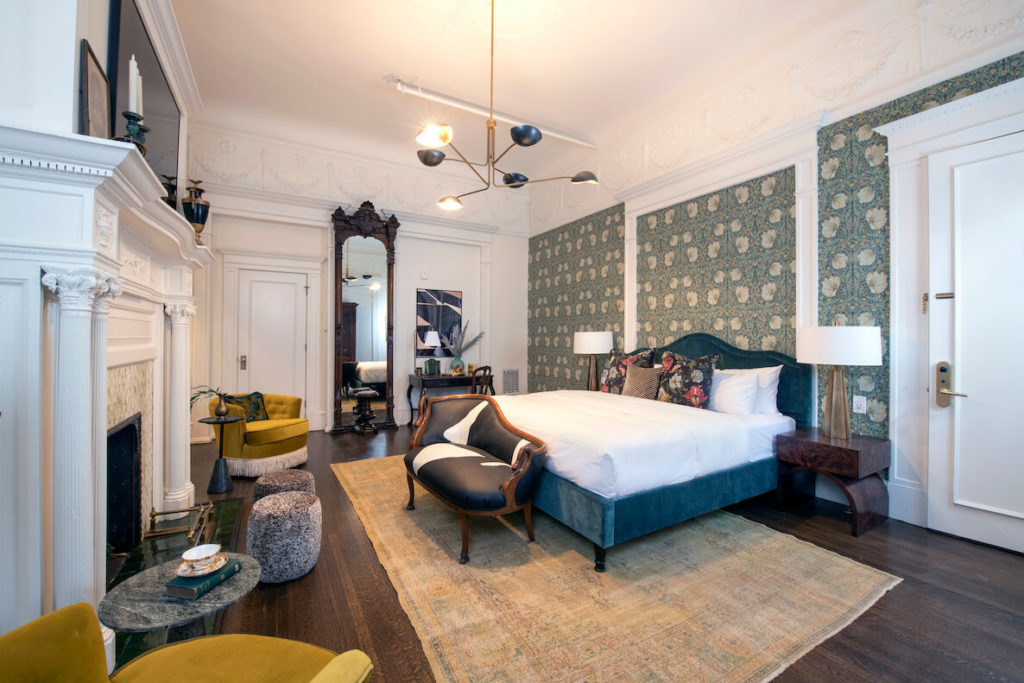
I’m learning about Eliza Turner from Brennan Tomasetti, the co-owner of the new Guild House Hotel, which opened this fall on the site of the organization’s former headquarters and incorporates its history—and its ethos—into the hotel’s unique design concept. A 12-room boutique hotel, the Guild House Hotelwas designed almost exclusively by women-owned firms, incorporates products from women-owned businesses and pays homage to the original occupants throughout the space.
Tomasetti and her husband, Michael, worked on the hotel for three years, during which she says she became obsessed with the project and the women who came before. I ask her why she feels such a kinship with these radical independent thinkers, and she surprises me by suddenly pausing as her eyes well-up ever-so-briefly before she explains.
RELATED: Read about more amazing Philadelphia women on our list of Women’s History Month all-stars
“I’ve always been a proponent of the feminist movement,” she says. “It goes back to me and my brother being raised by a single mom. She passed at a young age, but my mom worked in corporate America and I learned a lot from her. My grandmother was really involved with the League of Women Voters. It’s part of who we are, so throughout my career I’ve always worked hard to help other women get a seat at the table. So what these women did here with the Guild is remarkable. I’m grateful to be able to shine a light on their work and what they accomplished.”
“Throughout my career I’ve always worked hard to help other women get a seat at the table,” Tomasetti says. “So what these women did here with the Guild is remarkable. I’m grateful to be able to shine a light on their work and what they accomplished.”
Though the Tomasettis run a Philadelphia-based real estate investment company, Civetta Property Group, and have developed historic properties before, they had never dared to create a hotel. But in August 2018, along with three business partners, they purchased the four-story townhouse, built in 1851 and listed on the National Register of Historic Places. (The original organization, which had morphed into a private foundation now called the Gender Justice Fund, decided it made financial sense to sell the building and work out of the Friends Center at 1501 Cherry Street.)
“When we first surveyed the property,” explains Tomasetti, “it was quickly apparent that we would not demo. There was far too much history and gorgeous architectural detail, but the layout doesn’t lend itself to much else other than a single family dwelling or a small hotel.”
The partners all took a deep breath and asked: Is this the road we want to go down? “We decided it was,” recalls Tomasetti. “So we put together a plan to jump into the hospitality space for the first time.” Next was taking their vision—a 12-room luxury boutique hotel steeped in history with modern-day amenities—into reality.
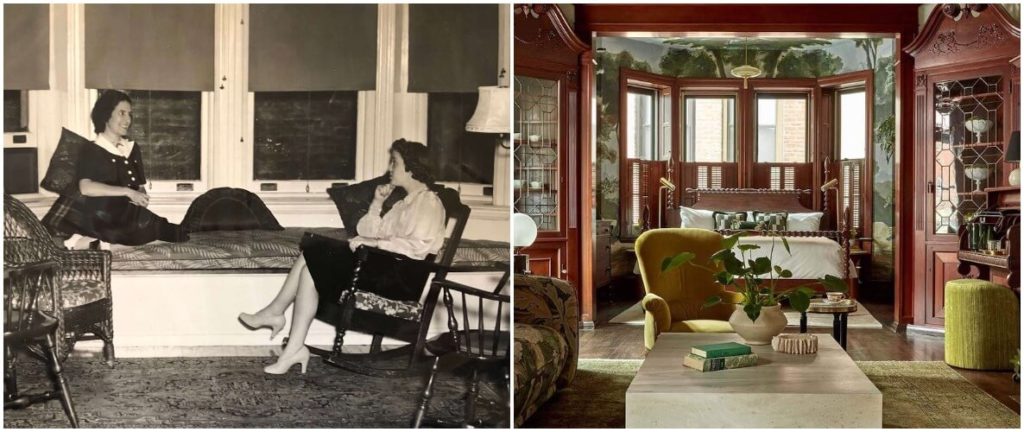
Many planning meetings with architects and historical commissions followed. Not only did they need to follow certain renovation restrictions to receive important historic tax credits, but they wanted to rehab their National Historic Landmark in a way that supported their vision of a chic retreat that didn’t make people feel they were staying overnight in a fussy museum.
Brennan Tomasetti began to spend lots of time across the street at the Historical Society of Pennsylvania researching the Guild and the women it served. There, she came across this description of the group: “For many women, the guild provided a haven away from the stresses of work, a place where they could obtain low-cost meals, sleeping accommodations, and even emergency financial assistance.
In 1887, the guild began publishing a newspaper written by and for members, the Journal of Women’s Work, which offered event calendars, advice columns, short stories, and poems. It also eventually formed its own library, gymnasium, and a variety of internal committees on which the members could serve.” The Guild’s charter committed it to provide for “the social, industrial, and educational culture and improvement of working girls and women, without any sectarian distinction.”
RELATED: How The Philadelphia Ten broke ground for female artists everywhere
“These women documented everything,” says Tomasetti. “There’s more than 100 boxes of archives with meeting notes, and member logs, pictures and other types of relics from the organization. As we dug in and learned about the organization and its members, we realized we just have to incorporate this into our overall concept somehow.”
What became abundantly clear pretty quickly is they were going to need help. They hired the architecture firm, Moto Designshop, as well as female-owned CWP Design for web and graphic design, and Citizen contributor Christine Speer Lejeune as their copywriter. They also engaged the design firm Rohe Creative, known for its distinctive work for restaurants, such as Harp & Crown, Double Knot and La Chinesca, and retailer Lapstone & Hammer.
“We found Rohe and I’m incredibly glad,” says Tomasetti of the all-female team led by founder Kate Rohrer. “When we laid out the story to them, they were head over heels in love with the idea of dedicating each room to a different member or founder of the Guild.”
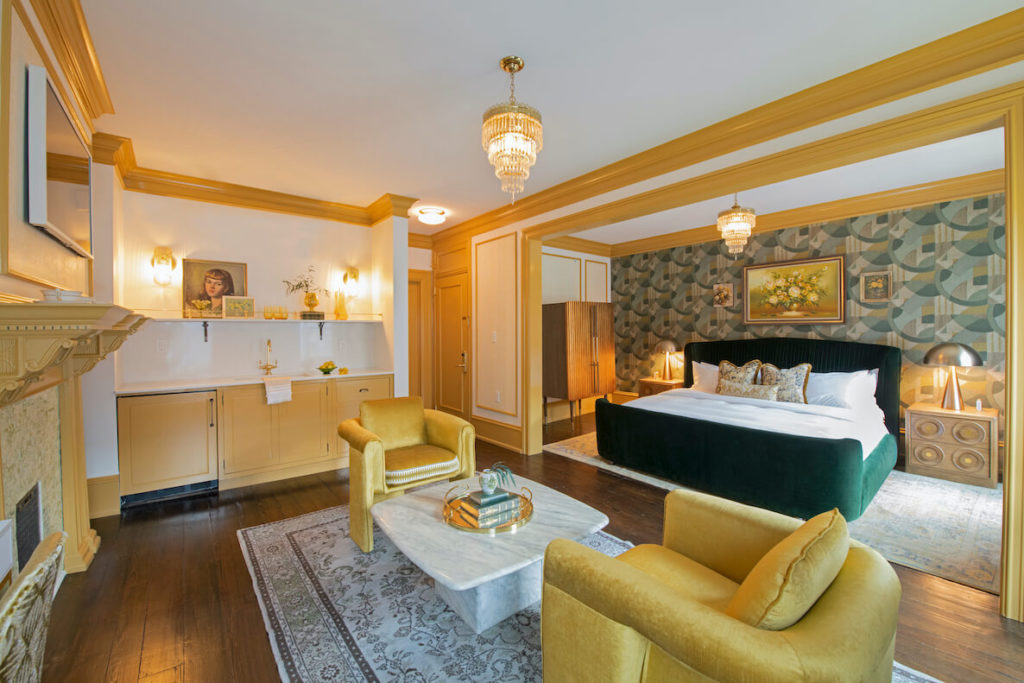
Guild House Hotel is similar in intent to Hotel Zena, which opened last year in Washington, D.C., with more than 60 works of art that celebrate female empowerment (including a portrait of Ruth Bader Ginsburg made out of painted tampons), and was also primarily conceived by women designers. Guild House, though, provides more than a visual experience; it’s also a mini history lesson.
As Tomasettti and I step inside the elegant townhouse, I realize that not only have I never heard of the visionary Turner before, but I have walked past the Guild headquarters at 1307 Locust Street countless times without even registering its existence. Our city is so dense with history that even when there’s a historical marker right outside (yes, there is!), we sometimes remain unaware of the hidden treasures right in front of us.
So what’s the experience like? There’s no check-in or front desk to welcome visitors. Guests receive a text with a passcode to the front door and their room. The management team is only a phone call away, but in these ongoing Covid times, it may be welcome for guests to not have to run a gauntlet of staff to get to their room.
“I hope [Eliza Turner] would be proud of this place,” says Tomasetti. “It’s become exactly what she was trying to enable: women flourishing in business.”
No two rooms are the same, but all have a consistent aesthetic throughout, and each has a few surprise artifacts from the original Guild. They come in varying sizes, with some suites, some with kitchenettes. The smallest (and least expensive at $209 during the week and $239 on the weekend) rooms are on the top floor. But the rooms are all uniformly appealing and comfortably luxurious. One has William Morris wallpaper and another has floor-to-ceiling landscape mural wallpaper. Some rooms have especially ornate ornamental plaster, while another has stunning mahogany paneling. All have such stunning millwork that Tomasetti laughs at the memory of how every single carpenter reacted in appreciative awe when they entered these rooms during the renovation.
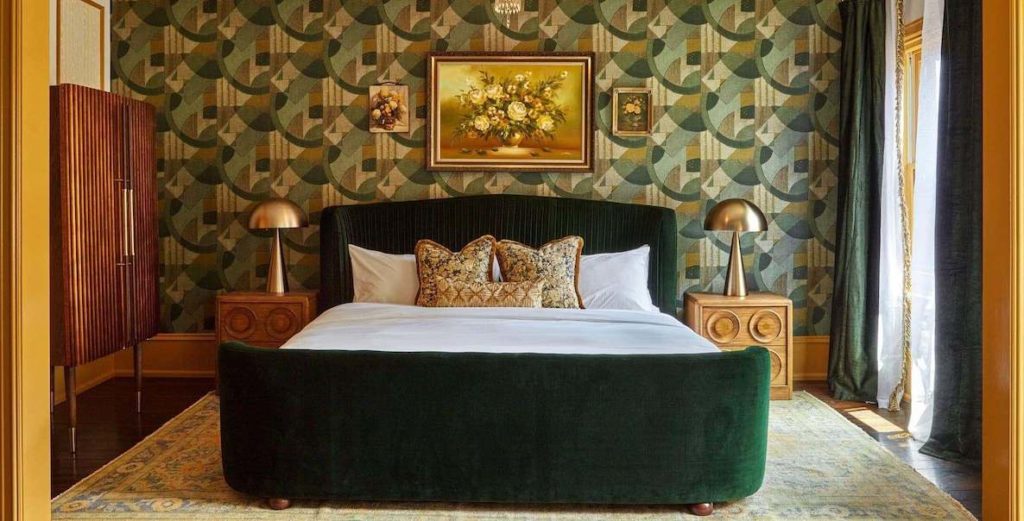
Rohe made sure to integrate contemporary pieces with period ones, so that desk or framed vintage photographs may be an original possession of the Guild. The decor is blended together so seamlessly that it is hard to know the difference.
Stay in the Alice Suite, named after Alice Norton, a dentist and head of the entertainment committee, and you’ll see the original piano heard at social gatherings. This space was once the auditorium used for lectures and performances. The larger bedroom in the suite, the most expensive suite in the hotel at $449 during the week and $599 on the weekend, is covered in a new custom toile wallpaper designed by Rohe featuring repeated images including Eliza S. Turner, the Noon Rest lunch gathering, and the recent Women’s March, complete with a Ruth Bader Ginsburg collar homage framing the scene.
The Gabrielle room, after artist Gabrielle Clements, has an original Dutch tile-covered fireplace. There’s an orange leather settee by the window that’s the perfect spot for an afternoon cup of tea. The Edith room, named for Edith Brubaker, the president of the Guild from 1903-23 who organized a 1915 suffragette parade down Broad Street where the women wore yellow-and-white armbands, has a yellow-and-white Art Deco scheme. By this point in the tour, I’m simply on a nonstop loop saying, “Wow! I love it.”
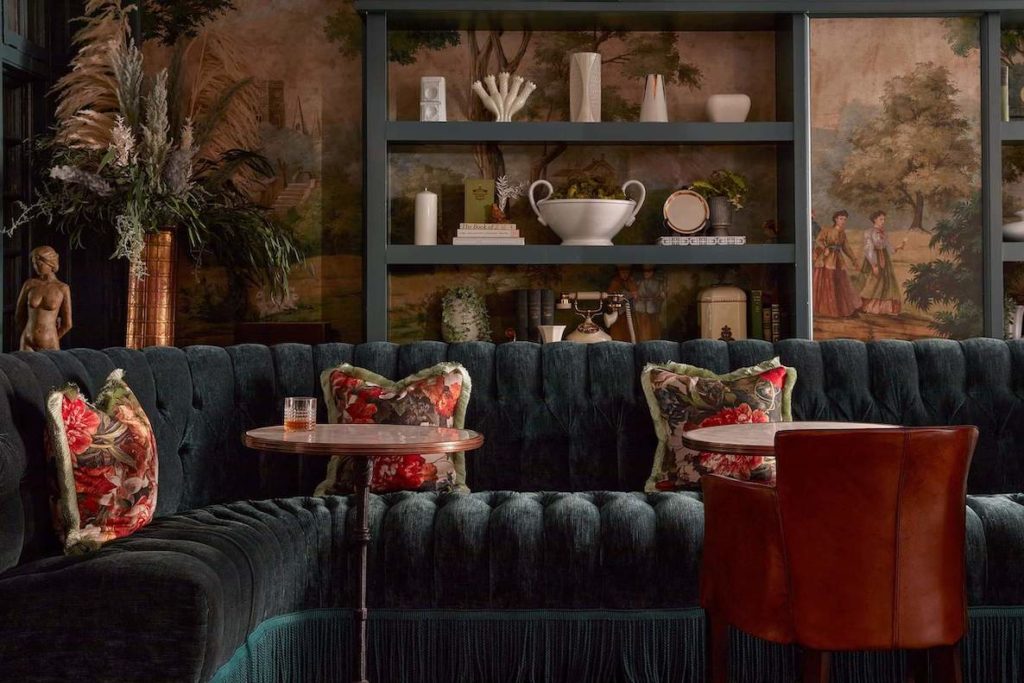
The rooms’ food and bath products are sourced from women-owned companies. The rooms with kitchenettes have tea from Blushing Wren Teas & Botanicals, a female-owned Philadelphia company, the coffee is by Sip & Sonder, a Black-owned company run by two women in Inglewood, California, the cookies are from Fishtown’s Feel Goodies. The bathroom products are by Fork & Melon, a company run by women in Southern California who crafted a custom scent for the Guild House Hotel.
Bookings have been busiest on weekends, but the word is spreading about this stylish hotel. Tomasetti tells me about a group of women who hosted a whiskey tasting in the lounge and about one of the hotel’s first guests, a man who popped the question to his girlfriend on a romantic getaway. (She said yes.)
As we walk into The Eliza suite, occupying the Guild’s former library complete with a decadent amount of ornate wood paneling, I ask Tomasetti what she thinks the club’s former leader might think of this hotel experience she and her team have created?
“I hope she’d be proud of this place,” responds Tomasetti. “It’s become exactly what she was trying to enable: women flourishing in business.”
![]()
MORE PHILADELPHIA HISTORY
Foodizen Podcast: The Most Famous Soup You’ve Never Heard Of
Guest Commentary: A Fitting Replacement for Christopher Columbus



